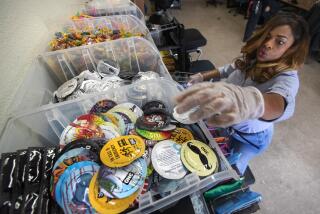From Raw-Goods Supplier to Finished Exports : Malaysia: Latex products augment income, but U.S. condom tests screen out many imports.
- Share via
Seven years ago, Malaysia’s rubber industry faced declining prices and increasing competition from other Southeast Asian nations to be the world’s leading supplier of raw latex.
While Malaysia remains a major exporter of the commodity, it has in the intervening years developed a substantial manufacturing segment that has become a leading exporter of finished rubber products--chiefly gloves and condoms--and thus added value to a flagging natural-resource industry.
Demand for latex gloves and condoms is booming because of worldwide concern about containing the spread of AIDS. One result: Malaysia has more than doubled its condom exports since 1988.
The greater emphasis on producing manufactured goods “is in line with the structural change in the Malaysian economy, transforming from an agrarian to an industrial economy,” said Ng Kok Tee, deputy chairman of the Malaysian Rubber Exchange and Licensing Board, the government agency that oversees rubber exports.
With subsidies and other incentives from the government, Malaysia’s rubber producers are diversifying. Take Sime Darby, for example. The 83-year-old, Kuala Lumpur-based company--known throughout Asia for its vast rubber plantations--now makes latex gloves and condoms, tires and medical products and is a developer of residential and commercial properties.
Diversifying into manufacturing was a natural move for Sime Darby because of its ready access to raw materials. “We own the land, we own the trees, so, it seems to be a logical thing to do,” said Sunny Yap, marketing coordinator for Sime Darby’s latex division, a maker of gloves and condoms. Sime Darby’s Seattle-based subsidiary is currently awaiting regulatory approval to distribute condoms in the United States.
The success of companies such as Sime Darby in the exporting of condoms has not been matched by increases in domestic sales, however. Government policy, reflecting Malaysian traditions and moral attitudes associating the use of condoms with promiscuity, bans condom advertising and severely restricts sales.
“You can’t advertise condom products through the mass media. That’s the problem,” said Kim Bum Ki, managing director of Hevealactics International, a South Korean-Malaysian venture that produces condoms.
More than half Malaysia’s population is Muslim, a religion that forbids using condoms as contraceptives and holds that they should be used only within marriage to protect against the transmission of disease, said Dr. Maher Hathout, a spokesman for the Islamic Center of Southern California.
Religion is not a factor in condom manufacturing, however, Hathout noted.
“The commodity in itself cannot be good or bad; the way it’s used is the decisive factor,” he said.
Malaysian manufacturers say they can live with the domestic restrictions because their home market is so small.
By contrast, the much larger U.S. market is a source of concern. As worldwide condom exports have grown each year, Malaysian sales in the United States have remained slow.
U.S. regulations play an important role in limiting the volume of Malaysian condom sales, manufacturers say. Some charge that the Food and Drug Administration, which must test and approve all condoms, has unfairly rejected Malaysian products to protect U.S. manufacturers.
“Manufacturers don’t want to sell in the United States because (the) FDA is protecting local suppliers--most of Malaysian exports face rejections from FDA,” Kim said. The company has stopped trying to export to the United States, he said, and instead concentrates on meeting increased demand from Asia and Africa.
An FDA spokeswoman said the agency’s policy is not motivated by protectionism. “It doesn’t matter who manufactures the condoms--it’s all held to the same standards,” she said.
Industry experts said the delays and other problems that Malaysian manufacturers encounter in seeking FDA approval are, in part, a result of the great distance between the two countries. For instance, FDA officials cannot easily inspect Malaysian manufacturing plants, they say.
U.S. manufacturers may encounter fewer problems winning FDA approvals, they say, because the FDA has likely been able to inspect domestic plants and has followed the process from inception. Their lack of familiarity with foreign manufacturing processes may lead inspectors to test imported condoms more stringently, the experts say.
Still, industry experts said, a more significant factor limiting Malaysia’s U.S. sales is the strength of companies that already dominate the market.
The U.S. market is controlled by three condom manufacturers: Carter Wallace, which makes the Trojan brand; Schmid Laboratories, which makes Sheik, and Ansell Inc., which sells the Lifestyle brand.
“It’s a very difficult market to break into,” said James S. Murphy, an industry expert who has worked for major American condom manufacturers.
Even if Malaysian products were priced lower than brands already established in the market, brand switching is unlikely because of the nature of the product, Murphy said.
“Would you pay 50 cents for a product you can trust, or 25 cents for a product you haven’t heard of? Are you going to worry about that quarter?” he asked.
Malaysian manufacturers may have some success with joint ventures in the United States, however.
One such venture involves Line One, a Los Angeles-based trading company. Once merely a representative of a Malaysian manufacturer, Line One became an investor in the Malaysian plants.
With some control of manufacturing, Line One has been able to help the Malaysians make products to meet FDA standards, said Robert Gruber, Line One’s sales manager. “We have better ties with factories overseas, so we can be updated with FDA regulations and keep (factories) updated,” Gruber said.
The venture now sells condoms, under the names Ria and Trustex, to government health agencies and novelty stores in the United States, such as Condomania.
Exporting Condoms
Falling prices and a labor shortage have slowed Malaysia’s production and export of rubber, but the nation has significantly increased production and exports of finished rubber products including condoms and gloves.
* Natural Rubber Exports
(billions of dollars)
1992: $0.868 billion
* Malaysian Condom Exports Worldwide
(millions of dollars)
1992: $7.8 million
* Malaysian Condom Exports to the United States
(millions of dollars)
1992: $0.45 million
Sources: Malaysian Rubber Research and Development Board; Malaysian Resource Center, Ohio University
More to Read
Inside the business of entertainment
The Wide Shot brings you news, analysis and insights on everything from streaming wars to production — and what it all means for the future.
You may occasionally receive promotional content from the Los Angeles Times.










